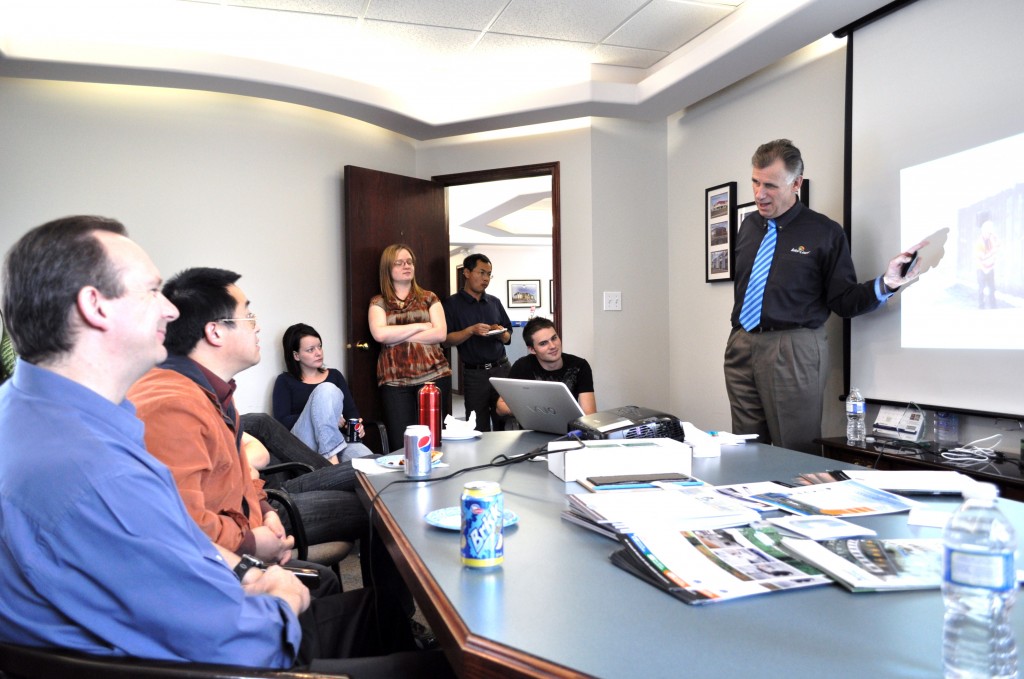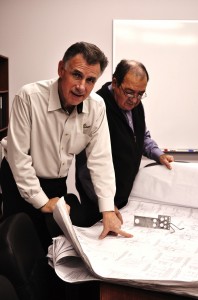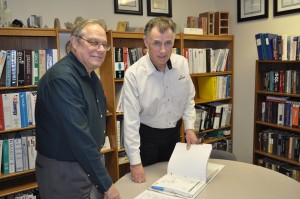Change is not only present in John Riley’s life, it seems to be omnipresent in every corner of his and his agency’s activities. In short order, here are some of the things where change has and continues to rear its head:
- Regular informal reviews of the agency’s principals
- Move to a new office
- Adapting to a developing technology and the creation of a new website
- Focus on the environment
- The hiring of intermediate sales professionals
- Formal alignment with other like-minded reps

John Riley presents a Lunch and Learn Seminar to a small group of engineers at Genivar Corporation in Red Deer, Alberta.
As a result, to say that Riley, CPMR, embraces change is probably an understatement. To describe him and his operation, let’s just try saying he inhales change. “I embrace change,” he says, “because overall by employing that philosophy we’re going to be better off. By not identifying and managing change, we’re going to miss future opportunities. I see that all the time. Consider for a moment, that in our business there are still salespeople around who will take an armload of catalogs to architects’ offices and hope to get an order. What sense does it make to send that guy out on a more than $300 sales call to just to drop off publications? That just doesn’t work any more. There are new ways of conducting business. In addition, consider what we’re doing here in North American society. If we’re planning on competing with the rest of the world, we’ve got to change.”
To understand how Riley got to this point, it’s necessary to take a look back at how InterCoast Sales Agency, Inc., came to be what it is today. The rep agency was founded in 2002 by Riley in Edmonton, Alberta, Canada. “Initially we worked with principals whose products had less than 1% share in construction markets west of Winnipeg. In spring 2003 we added two new principals: a specialty roof and waterproofing system and a water-based plastic foam spray insulation manufacturer.
Eye on the Environment
“Both major product lines have done extremely well in sales dollars. We are now recognized as a construction solutions provider with sales expertise to introduce and sell new and existing product lines to Western Canada. These products present the building owner/architect with new, innovative solutions to some of the biggest issues they face such as rising energy costs and water damage in the building envelope. More than 40% of our business comes from Alberta, while 50% is from British Columbia and the balance from Manitoba and Saskatchewan.”
Riley explains that his agency’s environmental philosophy has been built around “a desire to enhance the sustainability of the buildings where our products are used.” He adds that InterCoast’s focus on the environment is more than likely an outgrowth of his undergraduate studies at Lakehead University in Thunder Bay, Ontario, where he earned a BS in forestry engineering. “We’ve always been focused on the environment and that’s what has attracted me to the principals we represent.”

John Riley (left) and Dr. Mike Hatzinikolas the owner of FERO Corporation which manufacturers components for masonry construction.
The Importance of Manufacturer Reviews
Speaking of principals, Riley is quick to point out that reviewing the performance of his principals is hardly anything new for InterCoast and probably shouldn’t appear under the heading of change for the agency. “We’ve always gone through that process, but I’d caution that we believe in doing it in an informal, rather than a formal basis.”
He explains that reviews might be a little more formal during the first quarter of the year “When we meet in person with all of them. But for the most part, reviews are something that we conduct informally throughout the year. I’d maintain that the value of formal reviews is relatively nebulous in corporate Canada. What we do throughout the year is keep an eye on where we’ve been and where we’re going. If something isn’t going as it should — either by us or by the manufacturer — we expect corrective action to be taken immediately.”
Asked what he looks for in any review of his manufacturers, Riley says that “We always consider whether the manufacturer is providing us with new products and innovative ways to deliver the product to the market. We also look at whatever they’re doing when it comes to adding to my commission check, obviously by giving me more to sell. At the same time, I appreciate the fact that they’re not demanding a lot of frivolous paperwork thereby freeing me up to do what I do best — sell.”
Asked what he believes a manufacturer ought to be considering when they review his agency, Riley explains that the rep’s synergistic approach to selling customers ought to be heavily weighed. “Let me use the analogy of selling windshield wiper fluid. Selling it all by itself does no good; you need something to go along with it. So too is it with the products I sell. Many of these products aren’t mainstream so I can’t sell them by themselves. That’s why if a manufacturer is considering what I do for him, he’s got to consider, for example, my approach to ‘lunch and learns.’ I don’t conduct them with just one product in mind. I present the whole package to the customer with the goal of solving many of their problems.”
A 1,000-mile Move
In an effort to better anticipate and solve the problems of InterCoast’s customers, Riley explains that the agency has recently completed the relocation of its offices from Edmonton, Alberta, more than 1,000 miles to Vancouver, British Columbia. ‘We completed this move to allow us to better serve the major large architects and finally gain sales in several major development projects.” He admits that the move was no easy task, and “It took more than a year for us to get all the stars in the right quadrant. But we completed the task and are ready to go.”
Working with Technology

Denis Robertson (left), a structural engineer with WE Snihur Engineering and John Riley review a product design manual for an upcoming construction project.
As if a headquarters’ relocation, keeping an eye on environmental trends, and constantly evaluating principals wasn’t enough, Riley notes that he, just as so many other reps, has to wrestle with the rapidly changing world of technology. But if anyone could be said to approach that task optimistically it’s Riley. “As a business-building tool, we as manufacturers’ reps must learn how to use all the technological tools at our disposal to drive business to our agencies. Remember that the majority of people today are simply downloading information they need from the Internet. We’ve got to be the ones providing them with that information.”
He continues that his goal is to master the use of various technological tools and then “learn how to video blog. Once I do that, you’ll find me on everything from conducting webinars to a presence on Facebook, Twitter and LinkedIn.”
Another integral part of InterCoast’s use of technology easily can be seen with a visit to the agency’s website (www.intercoastsales.ca). “The website that visitors will find today is quite different from the one that was up just a few months ago,” Riley explains. “The initial appearance of the website was one that wasn’t beneficial to us. To correct the situation, I went out and hired a professional consultant to change things. I found that on my own, we were making wrong turns. Now things are the way they should be. We’re constantly tweaking our new site, refreshing content and changing the verbiage. We’re much more able to make enhancements and better serve our principals and customers.”
More Change
As mentioned earlier in this article, change is omnipresent in the world of John Riley and InterCoast Sales. As if the aforementioned wasn’t enough, consider:
• The agency is planning to facilitate growth in the Western Provinces of Canada by hiring “intermediate sales professionals who will be in charge of managing their own ‘business,’ which is their own sales territory. This position will most likely be located in Calgary and implemented the first quarter of 2011. For services provides, they will be compensated with a lucrative remuneration package based on commission, bonuses and profit sharing. This growth strategy is predicated on attracting top industry professionals with the talent and drive to ensure success.”
• InterCoast has formally aligned itself with about 20 other rep agencies in the United States and Canada to serve the dual purposes of allowing principals to launch products internationally; and allow the participating rep firms to come together and discuss areas of common concern. Riley notes, “It isn’t often that 20 egos work together such as we have congregated. We’ve already found that when we get together the benefits are plentiful.” Agency Sales magazine will report on the doings of this group of reps in a future issue.
On page 16 of this issue, there’s an article that describes what happens when a colony of penguins learns that its iceberg is slowly melting, thereby endangering the lives of those residents of Antarctica. As the changes that John Riley and InterCoast Sales have identified and managed successfully are considered, it’s easy to recall the analogy of an iceberg, as in we’ve only seen the tip of the iceberg of change that InterCoast eventually will create for itself.

